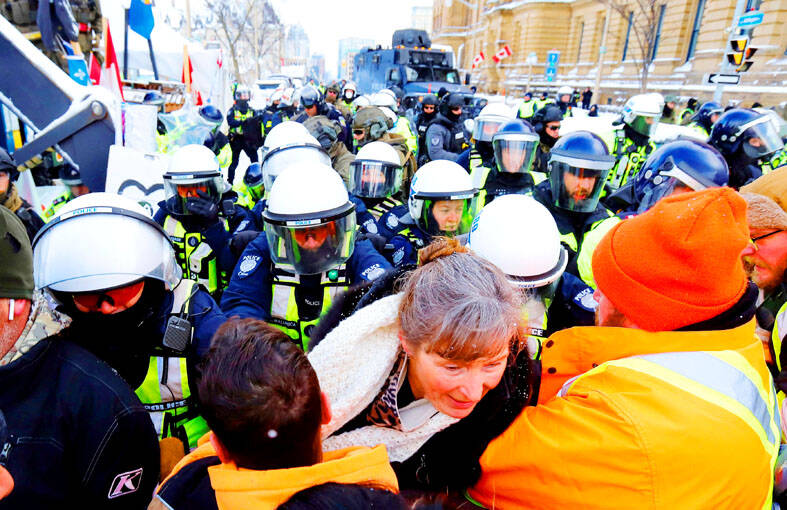The Canadian government was worried about the hit to its reputation from trucker-convoy trade disruptions as it negotiated with the US on electric vehicle (EV) incentives.
Canadian Deputy Minister of Finance Michael Sabia told a public inquiry into Canadian Prime Minister Justin Trudeau’s invocation of emergency powers that border blockades came at an especially bad time for Canada, which was already battling US protectionist measures.
Convoy protesters shut down multiple border crossings in mid-February, including the Ambassador Bridge into Detroit, Canada’s busiest trade corridor with the US and a vital link for the auto manufacturing sector.

Photo: Reuters
They also gridlocked downtown Ottawa for nearly a month, denouncing Trudeau and federal COVID-19 restrictions that included vaccine and testing mandates at the border, which they claimed hampered their business.
If the border blockades “were to continue for a period of time and became an even more significant threat to the American perception of Canada as a reliable trading partner, that was something with very severe long-term consequences,” Sabia told the inquiry on Thursday.
At least six auto plants near the US-Canada border were forced to slash production as the standoff at the bridge intensified. Toyota Motor Corp, General Motors Co, Ford Motor Co and Stellantis NV all either idled plants or reduced capacity.
Economists, meanwhile, were warning that the disruptions threatened Canada with an economic contraction while fueling inflation.
“There was concern within the American federal government, within the White House, about this issue,” Sabia said.
Trudeau and US President Joe Biden discussed the protests during a phone call on Feb. 11.
The bridge blockade also came amid Canada’s push against proposed Buy American tax incentives for EVs that would have favored vehicles made by unionized US workers, potentially in violation of the overhauled continental free-trade with the US and Mexico.
“There was no doubt that these disruptions, coming when they did in that process, brought with them the risk that we would not be able to get the North American treatment that we were eventually able to negotiate,” Sabia said.
The government, including the finance department, became focused on how to end the blockades as quickly as possible, he said.
The government feared there would also be a cascading effect on the economy as supply chains for various sectors were interrupted.
That led finance officials to begin examining what tools they had under Canadian legislation to cut off the flow of funding to the convoy and pressure people to end their participation in the blockades.
However, “pretty much anything that we could do would require a legislative change, and legislative changes by their nature take an extended period of time,” Sabia said.
Trudeau eventually invoked the Emergencies Act on Feb. 14, which included giving banks the power to freeze the accounts of people deemed to be participating in or funding the convoy blockades.
Sabia and one of his deputies told the inquiry that the government was not involved in deciding which specific accounts should be frozen. Instead, banks were instructed to take those decisions on their own, often on the basis of information provided by Canadian police.
The six-week inquiry began Oct. 13 and has heard from police officers, government officials, municipal politicians, and the convoy organizers themselves.

Thousands gathered across New Zealand yesterday to celebrate the signing of the country’s founding document and some called for an end to government policies that critics say erode the rights promised to the indigenous Maori population. As the sun rose on the dawn service at Waitangi where the Treaty of Waitangi was first signed between the British Crown and Maori chiefs in 1840, some community leaders called on the government to honor promises made 185 years ago. The call was repeated at peaceful rallies that drew several hundred people later in the day. “This government is attacking tangata whenua [indigenous people] on all

RIGHTS FEARS: A protester said Beijing would use the embassy to catch and send Hong Kongers to China, while a lawmaker said Chinese agents had threatened Britons Hundreds of demonstrators on Saturday protested at a site earmarked for Beijing’s controversial new embassy in London over human rights and security concerns. The new embassy — if approved by the British government — would be the “biggest Chinese embassy in Europe,” one lawmaker said earlier. Protester Iona Boswell, a 40-year-old social worker, said there was “no need for a mega embassy here” and that she believed it would be used to facilitate the “harassment of dissidents.” China has for several years been trying to relocate its embassy, currently in the British capital’s upmarket Marylebone district, to the sprawling historic site in the

‘IMPOSSIBLE’: The authors of the study, which was published in an environment journal, said that the findings appeared grim, but that honesty is necessary for change Holding long-term global warming to 2°C — the fallback target of the Paris climate accord — is now “impossible,” according to a new analysis published by leading scientists. Led by renowned climatologist James Hansen, the paper appears in the journal Environment: Science and Policy for Sustainable Development and concludes that Earth’s climate is more sensitive to rising greenhouse gas emissions than previously thought. Compounding the crisis, Hansen and colleagues argued, is a recent decline in sunlight-blocking aerosol pollution from the shipping industry, which had been mitigating some of the warming. An ambitious climate change scenario outlined by the UN’s climate

BACK TO BATTLE: North Korean soldiers have returned to the front lines in Russia’s Kursk region after earlier reports that Moscow had withdrawn them following heavy losses Ukrainian President Volodymyr Zelenskiy on Friday pored over a once-classified map of vast deposits of rare earths and other critical minerals as part of a push to appeal to US President Donald Trump’s penchant for a deal. The US president, whose administration is pressing for a rapid end to Ukraine’s war with Russia, on Monday said he wanted Ukraine to supply the US with rare earths and other minerals in return for financially supporting its war effort. “If we are talking about a deal, then let’s do a deal, we are only for it,” Zelenskiy said, emphasizing Ukraine’s need for security guarantees